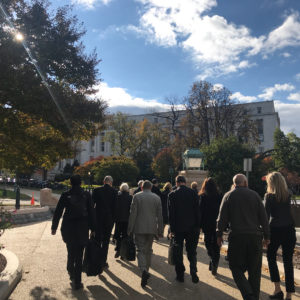Humanists Hit the Hill for the AHA’s First Lobby Day
 Photo via The AHA on Instagram
Photo via The AHA on Instagram Signifying the growing influence of humanism in our nation’s capital, humanists from around the country came to Washington, DC, this week to meet with twenty congressional offices in order to discuss the Johnson Amendment—specifically what the repeal of this amendment would mean for US elections, our houses of worship, and the separation between church and state.
For those who aren’t aware, the Johnson Amendment refers to a change in the US tax code made in 1954 that prohibits certain tax-exempt organizations from endorsing or opposing political candidates. The amendment affects churches and other nonprofit organizations with 501(c)(3) tax exemptions.
Repeal of the Johnson Amendment would have several important impacts on our democratic system. For example, political donations to churches, which would eventually be given to candidates or causes, would be tax-deductible, unlike other forms of political giving. Contributions to super PACs and to candidates are not tax-deductible. Just as important is the fact that with a repeal, donations to churches for political ends would be anonymous, unlike most other forms of political giving. This is especially concerning because while most 501(c)(3) groups must file a Form 990 with their tax return, which provides some information about the group and its activities, churches are exempt from that reporting requirement. As a result, their political spending would be nearly impossible to track. And of course, if the amendment is repealed, churches and other houses of worship would be able to endorse candidates from the pulpit and tie their endorsement to a religious imperative in order to sway their parishioners. Doing so would not threaten their privileged tax status.
The main focus of the lobbying visits were several pieces of legislation that would either repeal the amendment in its entirety, weaken the prohibitions contained in the law, or halt enforcement of the law.
The first of these bills is the deceptively named Free Speech Fairness Act, which was introduced by Rep. Steve Scalise (R-LA) in the House and Senator Tom Lankford (R-OK) in the Senate. This bill states that “an organization may not lose its tax-exempt status under section 501(c)(3) solely because of the content of any statement that: (1) is made in the ordinary course of the organization’s regular and customary activities in carrying out its exempt purpose, and (2) results in the organization incurring not more than de minimis incremental expenses.” This bill, if passed, would effectively allow churches and 501(c)(3)s to participate in campaign politics, so long as doing so wouldn’t incur new, sizeable expenses.
The second bill that was opposed by the humanist lobbyists is H.R. 172, which only has one co-sponsor, but would repeal the Johnson Amendment in its entirety and likely force the government to come up with a new regulatory scheme to ensure that 501(c)(3)s still allocate the majority of their spending for charitable purposes.
Finally, the attendees also discussed the Financial Services and General Government Appropriations bill, which contains a provision that weakens the Johnson Amendment by requiring consent from the IRS commissioner for each investigation into churches, notification to two committees in Congress, and a ninety-day waiting period before such investigations could commence. This bill would effectively cripple the Johnson Amendment by making the law essentially unenforceable, or extremely burdensome to enforce.
Throughout the day, American Humanist Association members found many congressional offices willing to work to oppose a repeal of the Johnson Amendment, as well as several staffers who stated that they too were humanists. A humanist member of Congress, Democratic Rep. Jamie Raskin of Maryland, also stopped in to talk to attendees about his legislative priorities and discuss how humanist values run throughout the Constitution. And while this first AHA lobby day brought a relatively small, select group of AHA members to the Hill, plans for next year’s event are underway with an aim to include nearly 100 activists to visit Capitol Hill and make the humanist voice heard to our elected officials.
